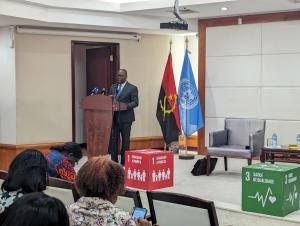Validation of the National Tuberculosis Strategic Plan 2023-2027 in Angola: A Collaborative Journey Towards Disease Control
Luanda, 8 November 2023 – Today, Angola has taken a significant step in the fight against tuberculosis with the validation of the National Tuberculosis Strategic Plan for 2023-2027, convening influential partners such as UNICEF, the Global Fund, UNDP, and UNAIDS in Luanda. This initiative signifies an important moment in the country's strategy to tackle this curable and preventable disease, which remains one of the leading causes of death worldwide.
During the validation, the plan was presented to participants for consideration, fostering discussions on the proposed strategies and actions. The World Health Organization (WHO), represented at the meeting, reiterated the seriousness of the global tuberculosis situation, with 1.3 million lives lost in 2022, including people co-infected with HIV. WHO emphasised the importance of a strategic plan that addresses the challenges posed by multidrug-resistant tuberculosis and the need for adequate funding to reach the targets set for 2030 and 2035.
On the other hand, the Secretary of State for Public Health, Dr. Pinto de Sousa, emphasised the Angolan Executive's satisfaction with the acceleration of the fight against tuberculosis. The strategy outlined by the National Strategic Plan reflects Angola's commitment to implementing an innovative and multisectoral approach, placing people at the centre of the disease combat actions. The negative impact of tuberculosis on not just health but also the country's economy and family life was highlighted, with an increase in cases observed in the previous year, partly attributed to COVID-19 confinement measures.
Collaboration between ministries, international partners, and civil society is extremely important for the effective execution of the plan. This meeting is a testament to the collective will to address the challenges in a united manner and with the application of assertive strategies and interventions, aiming ultimately to reduce the incidence and mortality of the disease in the country.
The expansion of the tuberculosis service network and the empowerment of municipalities to diagnose and treat the disease were highlighted as important victories. However, it is recognised that there are still many challenges ahead, such as the need to increase decentralised access to diagnosis and treatment, ensuring that innovative interventions are effectively implemented.
Greater awareness about tuberculosis is essential to encourage people to seek early diagnosis and treatment. The disease should not be stigmatized but rather managed with proper knowledge and resources. The implementation of this strategic plan is a step towards the goal of "Ending Tuberculosis by 2035," and Angola demonstrates its unwavering commitment at this significant meeting.
In summary, Angola's National Tuberculosis Strategic Plan is more than a document – it is a promise of a healthier future for all Angolans, highlighting the path forward for a country free of tuberculosis.
